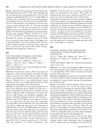 145 citations,
December 1999 in “Journal of Investigative Dermatology Symposium Proceedings”
145 citations,
December 1999 in “Journal of Investigative Dermatology Symposium Proceedings” Finasteride 1mg helps reverse hair miniaturization in men and postmenopausal women.
 1 citations,
January 2013 in “Hair therapy & transplantation”
1 citations,
January 2013 in “Hair therapy & transplantation” The document does not provide information about hair loss treatment.
July 2000 in “Hair transplant forum international” 7 citations,
May 2002 in “Hair transplant forum international”  2 citations,
April 2016 in “The Journal of Urology”
2 citations,
April 2016 in “The Journal of Urology” Finasteride 1mg linked to diverse symptoms; other treatments improve erectile function in rats.
 2 citations,
January 2008 in “Journal of Pakistan Association of Dermatology”
2 citations,
January 2008 in “Journal of Pakistan Association of Dermatology” Finasteride 1mg daily effectively increases hair growth and slows hair loss in men with male pattern baldness over two years.
 May 2016 in “The Journal of Sexual Medicine”
May 2016 in “The Journal of Sexual Medicine” Younger people (median age 35) experience more PFS-like symptoms with 1mg finasteride; more research needed.
 March 2014 in “Faculty Opinions – Post-Publication Peer Review of the Biomedical Literature”
March 2014 in “Faculty Opinions – Post-Publication Peer Review of the Biomedical Literature” Dutasteride 0.5mg was found to be more effective than finasteride 1mg in treating male pattern hair loss, with similar side effects.
 19 citations,
September 2016 in “Pharmacotherapy”
19 citations,
September 2016 in “Pharmacotherapy” Finasteride for hair loss increases risk of long-lasting sexual dysfunction.
 October 2020 in “Journal of Pakistan Association of Dermatology”
October 2020 in “Journal of Pakistan Association of Dermatology” Finasteride appears safe for long-term sperm concentration, but more research is needed for clear conclusions.
 March 2013 in “Reactions Weekly”
March 2013 in “Reactions Weekly” A man's fertility improved after he stopped taking finasteride but worsened again when he restarted the medication.
 August 2017 in “Drug and Therapeutics Bulletin”
August 2017 in “Drug and Therapeutics Bulletin” Finasteride may cause depression, suicidal thoughts, and sexual side effects.
 14 citations,
January 2008 in “Dermatology Online Journal”
14 citations,
January 2008 in “Dermatology Online Journal” Hormonal therapies like cyproterone acetate and spironolactone may help some women with hair loss, but finasteride 1mg is not useful, and the effectiveness of other treatments is still unclear.
 June 2017 in “Reactions Weekly”
June 2017 in “Reactions Weekly” Finasteride (Propecia) may cause depression and suicidal thoughts; stop use and inform a healthcare professional if symptoms develop.
 March 2024 in “Journal of Endocrinological Investigation”
March 2024 in “Journal of Endocrinological Investigation” Finasteride treatment in rats changed the expression of genes related to psychiatric and neurological functions, and these changes persisted after stopping the drug.
 June 2017 in “IP Indian journal of clinical and experimental dermatology”
June 2017 in “IP Indian journal of clinical and experimental dermatology” Using 10% topical minoxidil, oral finasteride, and microneedling together can effectively treat Male Pattern Baldness with high patient satisfaction and no major side effects.

Finasteride and low-level laser therapy are similarly effective for frontal pattern hair loss.
 6 citations,
April 2014 in “PubMed”
6 citations,
April 2014 in “PubMed” A man got brown patches on his skin (melasma) after taking finasteride, a hair loss treatment.
 July 2018 in “Reactions Weekly”
July 2018 in “Reactions Weekly” Lower finasteride doses had more side effects; dutasteride caused back pain; more research needed on post-finasteride syndrome.
 November 2017 in “Reactions Weekly”
November 2017 in “Reactions Weekly” Testosterone undecanoate caused hair loss; finasteride improved it but caused stomach issues for one patient.
 January 2017 in “Scripta Scientifica Vox Studentium”
January 2017 in “Scripta Scientifica Vox Studentium” Finasterid 1mg, used for male hair loss, can cause sexual problems in some men, which can last for several months even after stopping the medication.
 January 2018 in “Surgical and Cosmetic Dermatology”
January 2018 in “Surgical and Cosmetic Dermatology” Finasteride and dutasteride are effective for male hair loss and enlarged prostate but may cause reversible sexual side effects.
 January 2024 in “Expert Opinion on Pharmacotherapy”
January 2024 in “Expert Opinion on Pharmacotherapy” Low-dose oral minoxidil is effective and safe for treating hair loss in men and women.
 October 2016 in “International journal of medical research and review”
October 2016 in “International journal of medical research and review” Minoxidil, a hair loss treatment, may cause acne-like skin eruptions.
 January 2008 in “Dermatology Online Journal”
January 2008 in “Dermatology Online Journal” Hormonal therapy like cyproterone acetate and spironolactone may help female hair loss, but more research is needed, especially for pre-menopausal women.
 March 2019 in “Reactions Weekly”
March 2019 in “Reactions Weekly” Finasteride may increase risk of suicidal thoughts and self-harm.
 6 citations,
June 2019 in “Skin Research and Technology”
6 citations,
June 2019 in “Skin Research and Technology” Finasteride works for hair loss by maintaining existing hair follicles, not reversing miniaturization.
 1 citations,
May 1998 in “Inpharma Weekly”
1 citations,
May 1998 in “Inpharma Weekly” Finasteride works for male hair loss only.
November 2014 in “PharmaTutor” Finasteride may help postmenopausal women with hair loss but is not effective for all and should be used cautiously in premenopausal women.
 July 2021 in “Reactions Weekly”
July 2021 in “Reactions Weekly” Man experienced lasting sexual dysfunction from finasteride, but malpractice claim was rejected.


























